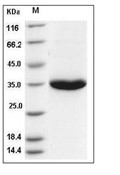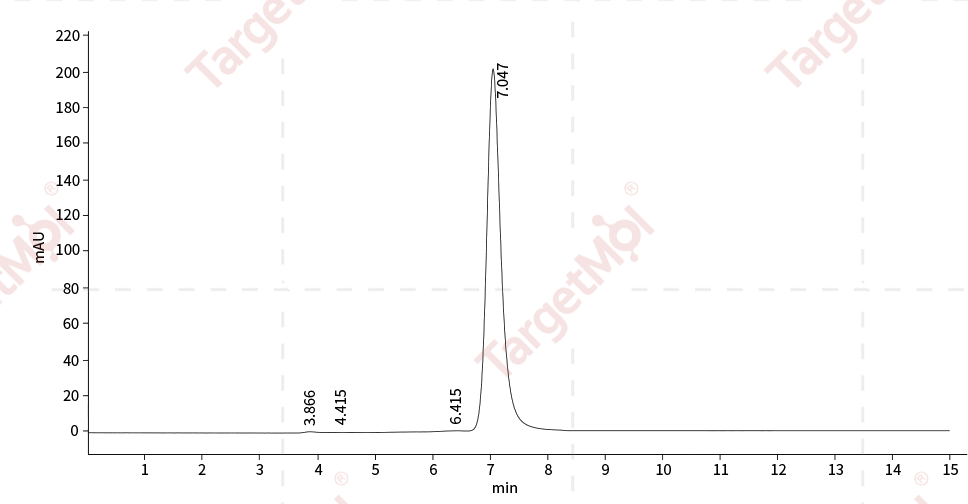- Remove All
 Your shopping cart is currently empty
Your shopping cart is currently empty
Kallikrein 3/KLK3 Protein, Human, Recombinant (His)
KLK3 (Kallikrein Related Peptidase 3) is a Protein Coding gene. The gene is one of the fifteen kallikrein subfamily members located in a cluster on chromosome 19. It encodes a single-chain glycoprotein, a protease that is synthesized in the epithelial cells of the prostate gland and is present in seminal plasma. KLK3, also known as Prostate Specific Antigen (PSA), kallikrein-related peptidase 3, Gamma-seminoprotein, is a secreted protein of the glandular kallikrein subfamily of serine proteases. KLK3 contains one peptidase S1 domain. KLK3 is a glycoprotein produced almost exclusively by the prostate gland. Growing evidence suggests that many kallikreins are implicated in carcinogenesis and some have potential as novel cancer and other disease biomarkers.Cancer ImmunotherapyImmune CheckpointImmunotherapyTargeted Therapy

Kallikrein 3/KLK3 Protein, Human, Recombinant (His)
| Pack Size | Price | Availability | Quantity |
|---|---|---|---|
| 50 μg | $361 | In Stock | |
| 100 μg | $616 | 7-10 days | |
| 200 μg | $1,050 | 7-10 days | |
| 500 μg | $2,130 | 7-10 days |
Product Information
| Biological Activity | Measured by its ability to cleave the colorimetric peptide substrate, Succinyl-Arg-Pro-Tyr-p-Nitroanilide(Suc-RPY-pNA). The specific activity is >100 pmoles/min/μg. (Activation description: The proenzyme needs to be activated by Thermolysin for an activated form) |
| Description | KLK3 (Kallikrein Related Peptidase 3) is a Protein Coding gene. The gene is one of the fifteen kallikrein subfamily members located in a cluster on chromosome 19. It encodes a single-chain glycoprotein, a protease that is synthesized in the epithelial cells of the prostate gland and is present in seminal plasma. KLK3, also known as Prostate Specific Antigen (PSA), kallikrein-related peptidase 3, Gamma-seminoprotein, is a secreted protein of the glandular kallikrein subfamily of serine proteases. KLK3 contains one peptidase S1 domain. KLK3 is a glycoprotein produced almost exclusively by the prostate gland. Growing evidence suggests that many kallikreins are implicated in carcinogenesis and some have potential as novel cancer and other disease biomarkers.Cancer ImmunotherapyImmune CheckpointImmunotherapyTargeted Therapy |
| Species | Human |
| Expression System | HEK293 Cells |
| Tag | C-His |
| Accession Number | P07288 |
| Synonyms | PSA,KLK2A1,kallikrein related peptidase 3,Hk3,APS |
| Construction | A DNA sequence encoding the human KLK3 (P07288) (Met 1-Pro 261) was fused with a polyhistidine tag at the C-terminus. Predicted N terminal: Ala 18 |
| Protein Purity | ≥ 95 % as determined by SDS-PAGE. ≥ 90 % as determined by SEC-HPLC.   |
| Molecular Weight | 28.3 kDa (predicted); 35 kDa (reducing conditions) |
| Endotoxin | < 1.0 EU/μg of the protein as determined by the LAL method. |
| Formulation | Lyophilized from a solution filtered through a 0.22 μm filter, containing PBS, pH 7.4. Typically, a mixture containing 5% to 8% trehalose, mannitol, and 0.01% Tween 80 is incorporated as a protective agent before lyophilization. |
| Reconstitution | A Certificate of Analysis (CoA) containing reconstitution instructions is included with the products. Please refer to the CoA for detailed information. |
| Stability & Storage | It is recommended to store recombinant proteins at -20°C to -80°C for future use. Lyophilized powders can be stably stored for over 12 months, while liquid products can be stored for 6-12 months at -80°C. For reconstituted protein solutions, the solution can be stored at -20°C to -80°C for at least 3 months. Please avoid multiple freeze-thaw cycles and store products in aliquots. |
| Shipping | In general, Lyophilized powders are shipping with blue ice. |
| Research Background | KLK3 (Kallikrein Related Peptidase 3) is a Protein Coding gene. The gene is one of the fifteen kallikrein subfamily members located in a cluster on chromosome 19. It encodes a single-chain glycoprotein, a protease that is synthesized in the epithelial cells of the prostate gland and is present in seminal plasma. KLK3, also known as Prostate Specific Antigen (PSA), kallikrein-related peptidase 3, Gamma-seminoprotein, is a secreted protein of the glandular kallikrein subfamily of serine proteases. KLK3 contains one peptidase S1 domain. KLK3 is a glycoprotein produced almost exclusively by the prostate gland. Growing evidence suggests that many kallikreins are implicated in carcinogenesis and some have potential as novel cancer and other disease biomarkers.Cancer ImmunotherapyImmune CheckpointImmunotherapyTargeted Therapy |
Dose Conversion
Sci Citations
Calculator
Tech Support

Copyright © 2015-2025 TargetMol Chemicals Inc. All Rights Reserved.


